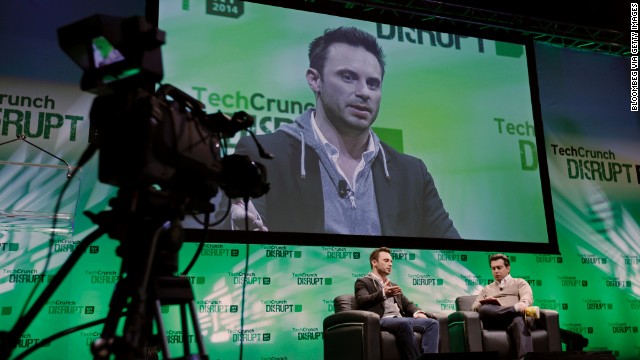
- Oculus CEO: We want a virtual-reality world with 1 billion people in it
- Brendan Iribe says Facebook deal was attractive because of network's size
- He says gaming is still important, but VR will transform social
- Iribe was speaking at TechCrunch Disrupt in New York
(CNN) -- When Oculus, makers of a virtual-reality headset many view as the future of video gaming, agreed in March to a $2 billion buyout by Facebook, they weren't tempted by the success of "FarmVille" or "Candy Crush."
Instead, they eyed the 1.2 billion people who use Facebook every month, with dreams of dropping most of them together into a new, virtual world.
"With Oculus ... if you're putting on this pair of glasses and you're going to be face-to-face communicating with people and you're going to be jumping in and out of this new set of virtual worlds, this was going to be the largest MMO (massively multiuser online community) ever made," Oculus CEO Brendan Iribe said Monday at the TechCrunch Disrupt conference in New York.
"This is going to be an MMO where we want to put a billion people in virtual reality, and a billion-person virtual-world MMO is going to require a bigger network than exists today. Why not start with Facebook and their infrastructure and their team and talent that they've built up?"
Designed by a team with strong roots in the video-gaming world, the Oculus Rift is a headset that provides a 360-degree field of vision, allowing wearers to view, and react to, their surroundings in a realistic manner.
Created by 20-year-old Palmer Luckey, Oculus first turned heads in 2012 when it went to Kickstarter in hopes of making enough money to continue development and ended up raking in nearly $2.5 million.
 Facebook ventures into virtual reality
Facebook ventures into virtual realityGaming legend John Carmack, the lead programmer of pioneering games such as "Doom" and "Quake," has since come on board, and the headset has been hailed by many, including CNN and Time, as one of the top inventions in recent years.
But when Oculus sold to Facebook, many in the gaming community were surprised. If they were going to sell, why not to Microsoft, Sony or Nintendo, the gaming world's major players?
Iribe said it was all about escaping limitations.
"We're very committed to gaming. But do we want to be Game Boy or do we want to be iPhone or Android?" he said, referring to Nintendo's now-defunct handheld gaming device. "I think Game Boy was an awesome platform, but I think you'll see handheld game devices largely disrupted by the mobile market and mobile devices."
Since developer kits began shipping in spring 2013, Oculus has continued to add to the roster of companies hoping to create content for its system. The process heated up even more in the wake of the Facebook deal, Iribe said, when some of the gaming world's top names jumped in, seemingly reassured that investing time in development would pay off in the long run.
But he says it would be a mistake to limit Oculus to gaming.
"We started off with a big focus on gaming, which we still have -- we're all former game developers," he said. "Then, looking at where vision and VR is going to go in the next 10 years, it's going to be a lot about face-to-face communication and social.
"A number of people ... have said this is going to be the most social platform of all time."
Thus far, Facebook seems satisfied to bring Oculus into the family and then largely allow it to continue doing its own thing. That's the model Facebook has employed with Instagram and WhatsApp, other successful startups it snapped up in recent years.
Facebook's $19 billion move you might not notice
Iribe said many within Oculus were leery of being taken over by anyone, and that Facebook CEO Mark Zuckerberg specifically mentioned Instagram and WhatsApp as examples of how the relationship would work.
"You can use any part of Facebook, or not; it's up to you guys," Iribe said he was told. "You now just have one of the biggest networks in the world behind you."
He also teased a mind-blowing new generation of virtual reality coming in the future from Oculus that will challenge our perception of what's real and what's not.
"This avatar you're looking at, your brain will be convinced it's a person, because it is," he said. "It's just the virtual representation of a person ... (but) you'll be there going, 'I know that's you. It doesn't quite look like you -- you're a cartoon or you've changed your hair -- but I can tell it's you.' And your brain will be convinced."
Source : http://www.cnn.com/2014/05/06/tech/innovation/oculus-vr-billion-users/